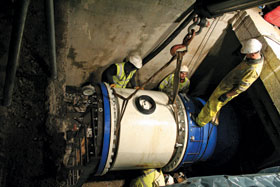

Electronic meters are enjoying growing popularity as operators increasingly recognise their contribution to the effective management of water networks. For many, a particular benefit is the ability of these meters to be installed virtually anywhere. ABB explains the benefits of buriable electronic meters and how advances in technology are opening up new possibilities in the way operators can collect and manage flow data.
With water companies demanding a wider range of data, there is a growing need to extend accurate metering as widely as possible throughout water distribution networks. This factor, coupled with the need for operators to control costs and minimise public disruption, has led to an increased interest in flowmeters that can be easily installed and require minimal maintenance throughout their lifetime.
The requirement to measure flows as widely and accurately as possible throughout a water distribution network is seeing meters being installed in an expanding range of locations. Particularly in remote or built-up areas where the ability to build a conventional installation chamber may be limited, meters which can be directly buried offer a number of significant advantages.
New technology facilitates versatility
The inherent robustness of electromagnetic flowmeters, coupled with advances in communications and in situ calibration technology, is seeing them being used in an increasing number of installations.
In the past, a conventional meter installation has required installations to incorporate a chamber for housing the actual meter, plus pavement furniture and ancillaries such as valves, strainers and extra pipe work. In this case, for every $1000 spent on a flowmeter, some $4000 is spent on installation.
In both these chamber-based and direct buried installations, challenges have also arisen around verifying the calibration and integrity of the flow sensor, transmitter and transmitter cable. The need for these to be checked has traditionally meant removing the sensor from the line, resulting in disruption and, where the sensor is buried, incurring additional time and cost for excavation.
Operators have also faced limited possibilities for communicating with buried meters. In remote areas especially, this has added to the cost of meter ownership, requiring field technicians to visit the meter and collect data manually.
Buriable flowmeters provide practical installation

Modern buriable flowmeters are helping to transform the cost and practicality of installation. With no need for chambers or connected equipment, these meters offer a simple, low cost solution that can be installed in virtually any location. The need for meters to be excavated and/or removed from the line is also being met by the arrival of in situ verification technologies.
New possibilities in communicating with an installed meter have also been opened up with developments in GSM-SMS technology. When used with a flowmeter, this technology can be used to provide operators with immediate access to a host of flow data, eliminating the time, cost and potential errors traditionally associated with the manual collection of flowmeter information.
Remote programming via SMS has highly significant and far reaching implications both for the quality of the data and for the overall management of meter stock, especially the management and distribution of flow data. It allows alterations to be made to the configuration of the instrument after installation, such as changing the power mode of the meter for the purposes of achieving enhanced performance. It enhances maintenance by offering performance and condition monitoring throughout the equipment’s life, with options such as programming the meter to send an alarm out in case of problems.
ABB’s solutions
ABB’s AquaMaster3 and WaterMaster flowmeters offer a practical alternative for installations where the construction of a chamber may be deemed too costly or disruptive. Both ranges bring a host of advanced features and functionality for water measurement. A key feature of the WaterMaster is its revolutionary octagonal sensor design. By improving the flow profile, the octagonal design minimises the upstream and downstream pipe lengths required from the point of installation, greatly reducing the cost of fitting the meters into new or existing pipelines.
The WaterMaster also features on board verification capability. Called VeriMaster, it assures operators of the performance of the meter through constant self-checking. When coupled with ABB’s VeriMaster software tool, it enables operators to produce a printed verification certificate for regulatory compliance.
All WaterMaster sensors have a rugged, robust construction to ensure a long, maintenance-free life even under the most difficult conditions experienced in water and wastewater applications. The sensors are inherently submersible (IP68, Nema 6P) as standard, ensuring suitability for installation in chambers and metering pits which are liable to flooding.
WaterMaster flowmeters are available in sizes from 10 to 2400 mm, with all sizes being buriable and are straightforward to install. The AquaMaster3 can be installed anywhere, making it highly suitable for irrigation applications. Available in sizes from 15 to 600 mm, the meter sensor can be buried, fully submerged or mounted in a chamber. The transmitter can be installed with it or separately at ground level up to 200 metres away.
With the introduction of a renewable energy option, the AquaMaster3 can be installed in even the remotest locations. Adding to the existing battery and mains-powered versions, it can be hooked up to sources as small as a 5 Watt solar panel or a 60 Watt wind turbine generator.
Requiring zero pipe diameters upstream and downstream, the AquaMaster3 is ideal for installations with limited space. The meter’s reduced bore sensor conditions the flow profile in the measuring section, flattening any distortions that could affect either upstream or downstream measurement, as proven through OIML R49 and MID testing.
With no moving parts to wear out, the AquaMaster3 provides a true fit and forget flowmetering solution, with no need for meter maintenance. Its advanced sensor design also means there are no obstructions, minimising flow pressure loss. All data collected by the AquaMaster3 is stored in an integrated data logger, which gathers data on both flow and pressure every 15 minutes. This data can be automatically sent daily via SMS to a receiver of the customer’s choice.
As a further assurance of a robust metering regime and lifelong accuracy, ABB also offers users its CalMaster2 in situ verification service for the AquaMaster3. Performed by an ABB service engineer, this service verifies a meter’s current operational status and also predicts any potential future faults. Users are issued with a traditional calibration verification certificate complete with an uncertainty statement.
Conclusion
Flowmetering technology has improved tremendously over the past few years and continues to do so. The new additions to buriable electronic meters with SMS capabilities and in situ verification and calibration systems, coupled with their inherently lower cost of installation and reduced lifetime cost, continue to make them an ever more attractive alternative to conventional mechanical metering technologies.
For more information contact Jacolize Goosen, ABB South Africa, +27 (0)10 202 5000, [email protected], www.abb.com/za
| Tel: | +27 10 202 5000 |
| Email: | [email protected] |
| www: | www.abb.com/za |
| Articles: | More information and articles about ABB South Africa |

© Technews Publishing (Pty) Ltd | All Rights Reserved